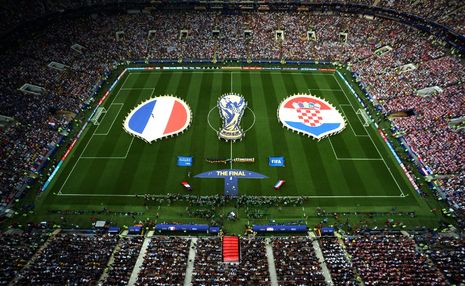If it ain’t broke, don’t fix it: The perils of football’s excessive tournament tinkering
Amidst increased calls for a biennial World Cup, Jack Wadding questions the impact of continuously changing formats

The dust has now settled on what was a summer full of passion, emotion and pride. Another international tournament has been and gone and what fun it was. Even in the years (of which there are many) when England disappoint, no-one can fail to enjoy the European Championships or the World Cup for the stories, the drama and the show. But Euro 2020 really was special. The Three Lions captured the hearts of the nation more than ever before as history-makers, record-breakers, political warriors and national heroes. But now it’s all over. It’s time to wake up from the dream that was Euro 2020.
These days, it seems as though the powers that be feel the need to constantly adjust, evolve and improve the format of football. Just this year, club football witnessed an unprecedented coup, a counter-revolution and a resolution all within the space of a 48-hour period in the middle of April. Even then, when we thought the Super League was dead and buried, the beloved Champions League still suffered a blow, its upgraded 2024-25 format right under the noses of the fans, but cunningly out of sight.
“What Arsène has overlooked is the fact that we already have annual international tournaments”
But top-down meddling isn’t restricted to club football. As of 2026, it has already been confirmed that World Cups will be made up of 48 teams, rather than 32. Granted, for the romantic, there are some obvious positives. More teams means more dreams, more stories and more drama. As Infantino has argued, more spots would also make the tournament more global, allowing more places for African (5 to 9), Asian (4.5 to 8) and Oceanian (0.5 to 1) nations. Equally, FIFA have presented an odd but practically feasible means of carrying out such a large tournament (sixteen groups of three, whose top two teams reach a round of 32) which, in fairness, only takes the tournament from 64 to 80 total games.
But, much like the Champions League reforms, the numbers just don’t add up. As we’ve seen with the Euros, both this year and in 2016, the 66% (16 from 24) qualification rate from the group stage (which would be matched in the new World Cup format) not only removes a significant amount of jeopardy (see Group F 2021) but also complicates matters unnecessarily (see 3rd place A/D/E/F). This would certainly be the case for a three-team World Cup group, where a nation will play only two games and where the team left out of the opening game is left at a disadvantage, since the opposing team will know precisely what is necessary to qualify. Furthermore, as the Deutscher Fußall-Bund (DFB) have argued, more teams will, by definition, reduce the quality of football at the tournament. But this alteration is, unfortunately, beyond the influence of the conservative fan, having been agreed in 2017.
But now, more news has emerged of discussions about the frequency of international tournaments, with Arsene Wenger, the recently appointed ‘improver’ of the game, at its forefront. As Euro 2020 paused between the quarters and the semis, news broke that Le Professeur had backed the idea to stage a World Cup every two years, rather than the traditional four. This comment follows the commencement of a feasibility study in May of this year into a biannual World Cup, which was triggered by a proposal put forward by the Saudi Football Federation.
“As avid consumers of the beautiful game, the instant reaction is to ask for as much as possible. But we can’t be greedy”
Much like the expansion of the tournament, this proposal has not been thrown down without consideration. Wenger’s idea is to have all qualifying completed in the month of October in order to play a competition every June. This, he argues, reduces the amount of time taken from the club season, which currently stands at a total of 50 days. Furthermore, CAF President Motsepe has publicly backed a biennial World Cup on the grounds of increased investment and development of African football.
Upon reading this news, my heart and my head were instantly at odds. Having enjoyed Euro 2020 so much, the idea that we could see a tournament every single year fills me with excitement. Specifically in relation to England, now would certainly be a good time to increase the frequency, since, they’re finally beginning to look competitive. So emotionally important are these tournaments that a significant proportion of the nation, myself included, measures time by the pattern of summer tournaments, with each one carving itself into our memory, whether due to hysteric failure or success.
But this is exactly why we can’t indulge ourselves with double the content. Think rationally. A tournament every year would unquestionably reduce the meaning and value behind each one. Would we really all get as excited if we’d just had a tournament the year before? Would we really all get so emotional if there was another coming the year after? And this applies to the teams as well. Over the last century, only eight nations have won a World Cup. What happens to the prestige of the trophy if we have double the winners? The whole reason we love international tournaments is because they transcend club football, which declares multiple winners each year.
Furthermore, the staging of a men’s international tournament every summer sidelines the women’s competitions entirely. What Arsène has overlooked is the fact that we already have annual international tournaments. The growth of the women’s game in recent years has been impressive and, as is clear from the men’s game, the greatest interest can be piqued when the national team is playing. So what would become of the Women’s World Cups and Euros? Would they simply become a sideshow? Ultimately, the idea of annual men’s tournaments suffocates the women’s game and allows it little to no space to grow.
Unfortunately, the point is that we have to pace ourselves. As avid consumers of the beautiful game, the instant reaction is to ask for as much as possible. But we can’t be greedy. Self-control is key. And quite frankly, the system works as it is. The four year pattern of men’s and women’s World Cups and Euros provides enough. As the saying goes: if it ain’t broke, then don’t fix it.
 News / Colleges charge different rents for the same Castle Street accommodation2 March 2026
News / Colleges charge different rents for the same Castle Street accommodation2 March 2026 News / King’s hosts open iftar for Ramadan3 March 2026
News / King’s hosts open iftar for Ramadan3 March 2026 Theatre / Lunatics and leisure centres 4 March 2026
Theatre / Lunatics and leisure centres 4 March 2026 News / Angela Merkel among Cambridge honorary degree nominees27 February 2026
News / Angela Merkel among Cambridge honorary degree nominees27 February 2026 News / Private school teacher who lied about Cambridge degree barred from teaching27 February 2026
News / Private school teacher who lied about Cambridge degree barred from teaching27 February 2026









